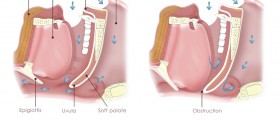
Anosmia OverviewAnosmia is a medical term for lack of the sense of smell, or olfaction. This disorder causes a complete loss of smell that can be either temporary or permanent. Loss of sense of smell can affect the sense of taste, because taste is, to a great extent, determined by the smell. Anosmia can occur, due to various reasons. Most of us have experienced temporary anosmia due to common cold or flu. Lack of smell sensation due to cold or flu clears up on its own after several days. Temporary anosmia can also occur due to nasal polyps, smell sensation recovers after the obstruction is removed. On the other hand, permanent anosmia may be due to aging or the brain tumor. Thereby, if you experience inability to perceive odors for long period of time it is recommended to visit your doctor because the symptom could indicate a serious condition.
Causes of Anosmia
Sense of smell originates in the olfactory epithelium, located in the nasal cavity. When we smell something, receptors in the olfactory epithelium transmit signals to the brain. In case of obstruction of the nasal passage or damage to the olfactory epithelium, the brain cannot receive the signals leading to loss of sense of smell, or anosmia.
Anosmia can be caused by several reasons. It can be due to nasal obstructions that are physically blocking the flow of air through the nose. This could be bone deformity in the nose or deviated septum. Nasal polyps can also restrain air flow through the nose and cause loss of sense of smell. Nasal polyps are benign growths inside the nose that can vary in size and color. If nasal polyps are small, they usually do not cause any symptoms. However, larger nasal polyps can lead to difficulty in breathing. This can be particularly troublesome while sleeping and cause sleep disturbances, a condition known as sleep apnea. Nasal polyps can also be responsible for frequent sinus infections and allergies.
In children, anosmia is often caused by foreign bodies obstructing the nose. Anosmia can be caused by damage to the olfactory epithelium. This can be caused by: brain tumor, inhaling cigarette smoke or toxic gases, frequent use of nasal sprays, aging process or a radiation therapy. Mucus lining in the nose can be damaged due to diseases such as: multiple sclerosis, Parkinson’s disease, schizophrenia and diabetes. Anosmia can be the result of severe head trauma, brain aneurysm, use of certain medications, hormonal disturbances or malnutrition. In some people, anosmia can be inherited condition.

















Your thoughts on this
Loading...